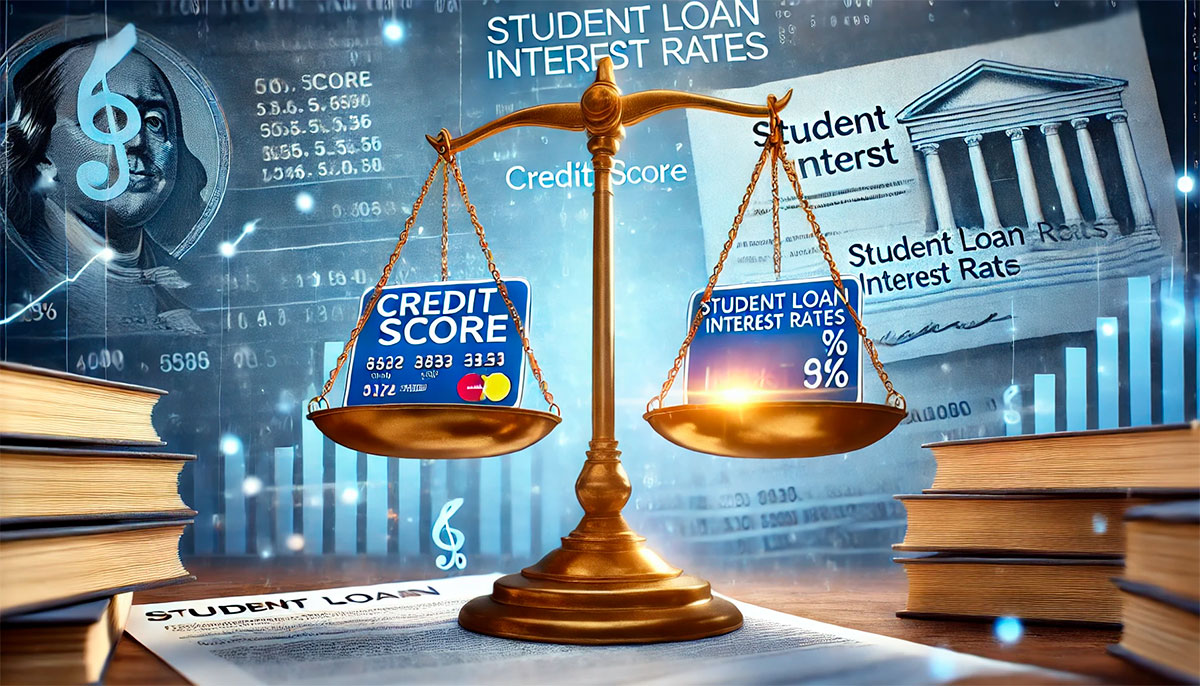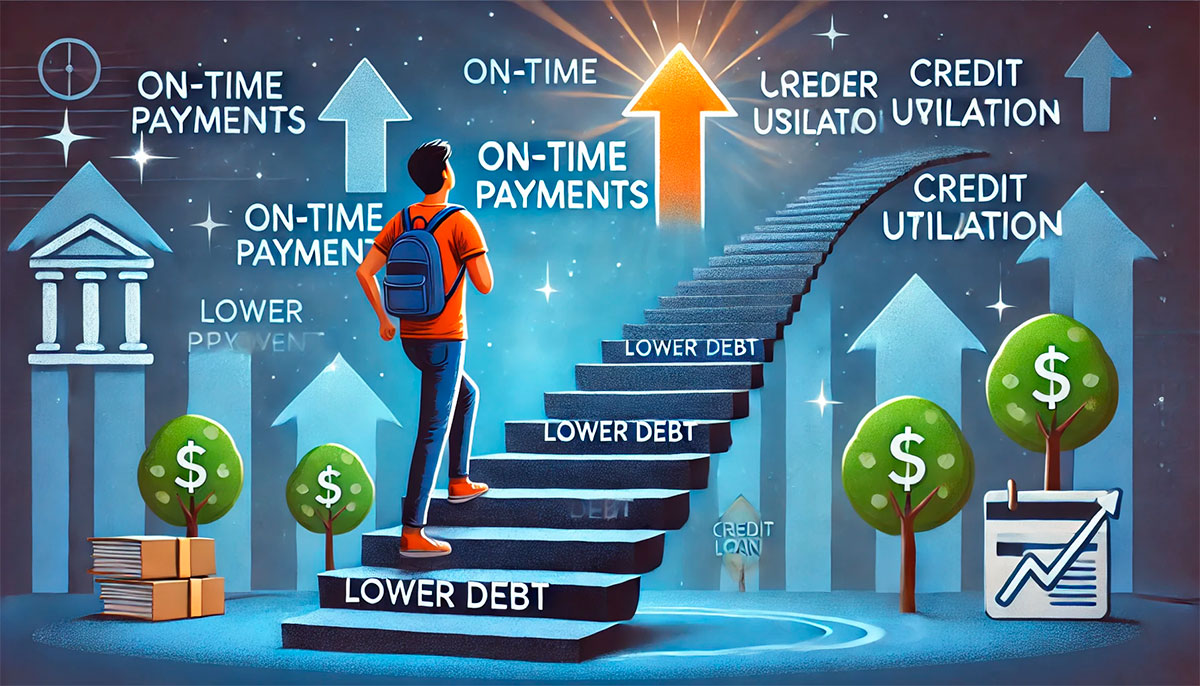
When applying for student loans, your credit score plays a crucial role in the loan approval process and can significantly impact the interest rates you receive. For many borrowers, understanding how their credit score influences these two factors is essential for navigating the student loan landscape effectively. In this article, we will explore how credit scores affect student loan approval and interest rates, offering insights into why your credit score matters and how you can improve it to secure more favorable loan terms.
What is a Credit Score and How is it Determined?
A credit score is a numerical representation of your creditworthiness, based on your credit history. It is calculated using a variety of factors, including your payment history, credit utilization ratio, the length of your credit history, types of credit accounts, and recent credit inquiries. Generally, credit scores range from 300 to 850, with higher scores indicating better creditworthiness.
Lenders, including those offering student loans, use credit scores to assess the risk of lending money. A higher credit score suggests that you have a history of managing debt responsibly, which makes you a less risky borrower. Conversely, a lower credit score suggests that you may have trouble repaying the loan, leading to higher interest rates or even denial of your loan application. It’s important to note that while your credit score is a crucial factor in private loan approval, federal loans have different criteria and don’t consider your credit score when awarding loans.
How Credit Scores Affect Student Loan Approval
Your credit score plays a critical role in whether you will be approved for a student loan, especially for private loans. Federal student loans, such as Direct Subsidized and Unsubsidized Loans, do not require a credit check, so your credit score does not impact approval for these loans. However, if you are applying for private student loans, lenders will review your credit score to determine whether you qualify for a loan and the terms they will offer.
For private loans, the higher your credit score, the more likely you are to be approved for a loan. Lenders view borrowers with high credit scores as lower risk, making them more willing to lend money. A good credit score means that the borrower has demonstrated responsible credit management in the past, which provides lenders with confidence that the loan will be repaid on time. On the other hand, if your credit score is low, lenders may be hesitant to approve your loan application. In some cases, borrowers with poor credit scores may need a co-signer, such as a parent or guardian, to secure the loan and improve their chances of approval. Lenders may also require the borrower to meet other financial criteria, such as proof of income or employment, especially when the credit score is on the lower end of the spectrum.
Private loan approval depends heavily on your credit history. Some lenders might be willing to overlook a low credit score if the borrower has a stable income or a good co-signer, but in general, a strong credit score significantly increases the likelihood of approval. Without a solid credit score, borrowers may face rejection, leaving them with fewer financing options or the need to rely on a co-signer for loan approval.

How Credit Scores Affect Interest Rates
Once you are approved for a student loan, your credit score will also influence the interest rate you are offered. A higher credit score typically results in a lower interest rate because lenders view you as a less risky borrower. This can save you money in the long run, as a lower interest rate means you will pay less in interest over the life of the loan. If your credit score is high, lenders may offer you lower interest rates and more favorable terms, ultimately reducing the overall cost of the loan.
In contrast, if your credit score is low, lenders may charge you a higher interest rate to compensate for the additional risk. A higher interest rate can significantly increase the total cost of your loan, making it more expensive over time. For borrowers who have good credit scores, the difference in interest rates can be substantial. Over the life of the loan, even a small difference in interest rates can add up to a significant amount of money. Therefore, it’s important to consider your credit score when applying for student loans, as it will affect not just whether you are approved but also the terms of the loan.
Additionally, if your credit score is below a certain threshold, lenders may refuse to approve your loan application or offer you loans with unfavorable terms, such as higher interest rates or a requirement for a co-signer. As a result, improving your credit score before applying for a student loan can help you secure better terms and lower the long-term cost of borrowing.
| Credit Score Range | Loan Approval Likelihood | Interest Rate Impact |
|---|---|---|
| 750 and above | Highly likely to be approved | Lowest interest rates, favorable loan terms |
| 700 – 749 | Likely to be approved | Competitive interest rates, good loan terms |
| 650 – 699 | Moderate chance of approval | Higher interest rates, less favorable terms |
| 600 – 649 | Low chance of approval | High interest rates, may need a co-signer |
| Below 600 | Unlikely to be approved | Very high interest rates or outright denial |

What to Do if Your Credit Score is Low
If your credit score is low, there are several steps you can take to improve your chances of loan approval and secure better interest rates. One of the most effective ways to improve your credit score is by paying down any existing debt. Focus on reducing high-interest debt, such as credit card balances, and aim to lower your credit utilization ratio. The lower your credit utilization (the percentage of available credit you are using), the better it looks to lenders.
Additionally, making timely payments on any outstanding loans or credit card bills is crucial for improving your credit score. If you have any missed payments, work to get back on track by paying your bills on time moving forward. Keep in mind that improving your credit score takes time, so it’s important to start early and give yourself several months to see significant improvement.
If you’re struggling with your credit score and cannot qualify for a loan on your own, consider applying with a co-signer. A co-signer is someone who agrees to take responsibility for the loan if you are unable to make payments. A co-signer with a strong credit history can help you secure a loan and obtain more favorable terms. However, it’s important to keep in mind that if you fail to repay the loan, your co-signer will be held accountable.
Your credit score plays an integral role in both the approval process and the interest rates you are offered for student loans. While federal loans do not require a credit check and are typically available to most borrowers, private loans rely heavily on your credit history to determine whether you qualify and the terms you receive. A higher credit score improves your chances of loan approval and can lead to lower interest rates, ultimately saving you money over time. If your credit score is less than ideal, consider taking steps to improve it before applying for loans, or consider using a co-signer to help secure the loan. By understanding the impact of your credit score, you can make more informed decisions when it comes to borrowing for your education.




